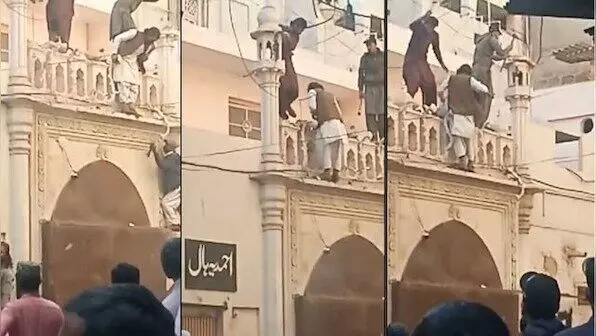Filling the fractures
The ongoing persecution of minorities in Pakistan calls for an unbiased, bold and proactive response from the government to end the decades-long era of communal violence

In the last 77 years since Pakistan attained its independence, there has been no let-up in the persecution of minorities, including Hindus, Christians, Ahmadis, and Shias. There had been large-scale violent attacks targeting Shias and Ahmadis during the holy month of Ramadan and even during the festival of Muharram. Significantly, there were also a series of dastardly violent attacks on various places of worship, including mosques, demonstrating scant respect for religious tenets. The perpetrators of such crimes more often got their acts condoned by established institutions and government machinery, bringing more shame to the polity and the security establishment and obviously raising suspicions about a State hand in it.
Against this backdrop, it becomes imperative to dwell upon several violent target killings of Ahmadis in Pakistan. The most recent victim of such activities is Zakaur Rahman, who was assassinated on July 27 at his dental clinic in a cold-blooded manner. While the Ahmadi community representatives have condemned the incident, saying there has been intense propaganda against Ahmadis this year, with several attacks claiming lives and resulting in the desecration of their places of worship, they have also expressed outrage and disappointment over the lack of any action against those who regularly spread hatred and abet violence against this particular minority community. Zaka, the latest victim, was a local official of Jamaat-e-Ahmadiyya. Those who knew him say he had no dispute with anyone and was never controversial.
Furthermore, spokesperson of the Pakistan Ahmadiyya Community Amir Mehmood has strongly condemned the brutal killing of the dentist, stating that two Ahmadis, Ghulam Sarwar and Rahat Ahmad Bajwa, were also killed earlier in Saadullahpur, District Mandi Bahauddin (June 8), and in District Hasilpur (March 4). Before this, local leader of the Ahmadi community in Multan, Tahir Iqbal Cheema, was fatally shot. Such horrific killings do not rule out the complicity of the State as well.
Subsequently, Ahmadis were killed in cold blood in Saad Ullah Pur on July 8, including the President of the Bahawalpur Ahmadiyya Community on March 4, 2024. Ahmadiyya leaders are calling for the safety of their places of worship and cemeteries, requiring effective protection from attacks and vandalism. They are also raising concerns about arbitrary arrests and detentions of Ahmadi worshippers during their religious holidays to obstruct their participation in religious practices.
Importantly, the attacks came after the Supreme Court’s recent decision to grant bail to Mubarak Sani, an Ahmadi. The ongoing hate campaign against Ahmadis has further intensified. Even judges of high courts have been subjected to this campaign.
Meanwhile, in another disturbing incident involving minorities, Shia and Sunni clashes in the Afghan border town of Kurram resulted in 43 deaths. This could be a case of sectarian violence and shows the extent of bloodshed in Pakistan.
In the meantime, in a bold editorial, ‘Dawn’, the prominent Pakistani daily, has said that the cancer of fanaticism continues to eat away at Pakistan’s vitals, taking innocent lives and causing communal ruptures in society that are very difficult to heal. The latest victims of such hate include two Ahmadis who were gunned down in apparently targeted killings in the South Punjab town of Phalia. Both were shot dead by a teenage suspect who attended a local seminary. The suspect’s confessional details, which ‘Dawn’ reported quoting law enforcers, are a chilling reminder of the ongoing radicalisation process that turns ordinary people into cold-blooded killers. According to the police, the young suspect said he was motivated by content on social media to kill members of the Ahmadi community. Moreover, a spokesman for the minority group claimed that a hate campaign spearheaded by some local preachers targeting the community had been launched several weeks ago. While many members of the minority community have been killed, their graveyards have also been defiled, and their places of worship targeted, even in supposedly more ‘cosmopolitan’ areas like Karachi. This exhibits a virulent religious radicalisation campaign currently gripping Pakistan.
‘Dawn’ has further opined that deradicalisation being a long-term project may take years — if not decades — to reverse the course. But what the State can do immediately is ensure that citizens belonging to all faith groups live in peace and harmony. Those involved in murderous attacks based on religious grounds must be swiftly brought to justice, while those who aid and abet hate groups similarly need to face the law. Censorship cannot be supported, and hatemongers cannot be permitted to misuse social media and the Internet to rouse religious hatred, fomenting violence. These are strong words and show that at least a section of the Pakistani media is speaking for the minorities. Their prescription perhaps needs to be heeded by the government.
This said, however, unless the State seriously assumes responsibility to curb the excesses, minorities, including Ahmadis, who are treated as untouchables, will continue to reel under a grave sense of insecurity and fear.
The writer is a retired IPS officer, Adviser NatStrat, and a former National Security Advisor in Mauritius. Views expressed are personal



